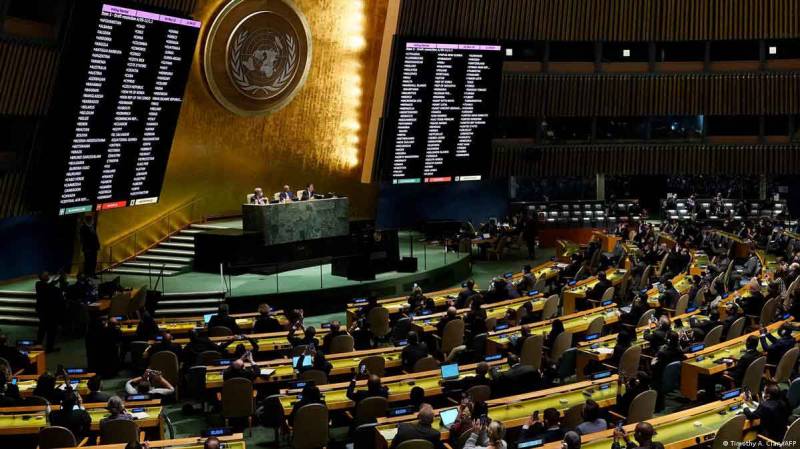UNITED NATIONS - Pakistan Thursday abstained on a UN General Assembly resolution that expressed deep concern over the volatility in Afghanistan since the 2021 takeover of the Taliban, and the persistent violence and presence of terrorist groups as well as abuse of human rights, including those of women, girls and minorities, saying that the text was “unbalanced and unrealistic”. The 193-member Assembly passed the resolution by a recorded vote of 116 in favour to none against, with 10 abstentions. China, Russia, Belarus, Burundi, North Korea, Ethiopia, Guinea, Nicaragua and Zimbabwe were the other abstainers. The resolution, entitled “The situation in Afghanistan” reiterates its unwavering commitment to international humanitarian law and the human rights of all Afghans. Deeply concerned about the dire economic and humanitarian situation, it called on the Taliban to ensure the security of humanitarian workers there. Also by the wide-ranging resolution, the Assembly expressed deep concern about the growing repression of fundamental freedoms and strongly emphasized the need to investigate allegations of human rights abuses in Afghanistan. It reiterated its serious concern about the continuing violence and the presence of terrorist groups such as Al-Qaeda and Islamic State in Iraq and the Levant (ISIL) also known as Da’esh. The resolution noted with grave concern that millions of people face emergency levels of food insecurity and acknowledged that women and children are disproportionally affected by the humanitarian crisis. Speaking in an explanation of their position, Ambassador Aamir Khan, deputy Pakistani permanent representative to the UN, said he had abstained because the resolution was unbalanced and, in several respects, unrealistic, pointing out that it does not acknowledge the de-facto new government in Afghanistan. It does not delineate any process to promote normalization in Afghanistan through a process of engagement with the de-facto government, he said adding that there was no commitment to unfreeze Afghanistan’s national reserves, and no commitment to help Afghanistan’s economic recovery beyond humanitarian assistance. “In particular,” Aamir Khan said, “ Pakistan is disappointed that one delegation was allowed to block references to the specific mention of terrorist organisations, including the TTP, as well as references to the role and contributions of the OIC to peace and stability in Afghanistan”, obviously referring to India’s role during the consultations process. At the same time, the Pakistani delegate welcomed the resolution’s commitment to the sovereignty and territorial integrity of Afghanistan as well as the references to its overcoming security challenges and enhancing human rights, Earlier in the day, opening the debate before the vote, General Assembly President Csaba Korosi of Hungary expressed alarm that the United Nations humanitarian appeal for Afghanistan is only half funded. With winter just weeks away, member states must reduce the $2.3 billion shortfall. Korosi said it was deeply concerning that narcotics now make up the country’s largest economic sector. “We know where these drugs are sent and we know who profits from these drugs,” he said, also calling on the Taliban to engage in serious counter-terrorism dialogue and stop the flow of foreign extremists into the country.
Friday, April 19, 2024
Pakistan abstains from voting on UNGA resolution on ‘situation in Afghanistan’

A Tense Neighbourhood
April 19, 2024
Dubai Underwater
April 19, 2024
X Debate Continues
April 19, 2024
Hepatitis Challenge
April 18, 2024
IMF Predictions
April 18, 2024
Kite tragedy
April 19, 2024
Discipline dilemma
April 19, 2024
Urgent plea
April 19, 2024
Justice denied
April 18, 2024
AI dilemmas unveiled
April 18, 2024
ePaper - Nawaiwaqt
Advertisement
Nawaiwaqt Group | Copyright © 2024





